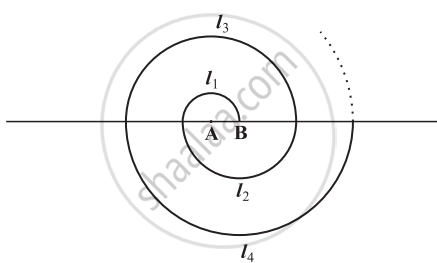Advertisements
Advertisements
प्रश्न
If \[\frac{1}{x + 2}, \frac{1}{x + 3}, \frac{1}{x + 5}\] are in A.P. Then, x =
विकल्प
5
3
1
2
उत्तर
Here, we are given three terms,
First term (a1) = `1/(x + 2)`
Second term (a2) = `1/(x + 3)`
Third term (a3) = `1/(x + 5)`
We need to find the value of x for which these terms are in A.P. So, in an A.P. the difference of two adjacent terms is always constant. So, we get,
d = a2 - a1
`d = (1/(x + 3)) - (1/(x + 2 ))`
`d = ((x + 2) - (x - 3))/((x + 2)(x + 3))`
`d =(x +2-x - 3)/((x + 2)(x + 3))`
`d =( -1) /((x + 2)(x +3 ))` ...............(1)
Also,
`d = a_3 - a_2`
`d = (1/(x +5 ) ) - (1/(x + 3))`
`d = (( x + 3) - ( x + 5) ) /((x + 5)(x +3 ))`
`d = (x +3 - x - 5)/((x + 5)(x + 3))`
`d = (-2)/((x + 5)(x + 3))` .............(2)
Now, on equating (1) and (2), we get,
`(-2)/((x +5)(x + 3)) = (-1)/((x + 3)(x +2 ))`
2(x +3 )( x + 2) = 1 (x +5 ) ( x +3 )
2x + 4 = x +5
2x - x = 5 - 4
x = 1
Therefore, for x = 1 , these three terms will form an A.P.
APPEARS IN
संबंधित प्रश्न
How many terms of the series 54, 51, 48, …. be taken so that their sum is 513 ? Explain the double answer
If the term of m terms of an A.P. is the same as the sum of its n terms, show that the sum of its (m + n) terms is zero
A spiral is made up of successive semicircles, with centres alternately at A and B, starting with centre at A of radii 0.5, 1.0 cm, 1.5 cm, 2.0 cm, .... as shown in figure. What is the total length of such a spiral made up of thirteen consecutive semicircles? (Take `pi = 22/7`)

[Hint: Length of successive semicircles is l1, l2, l3, l4, ... with centres at A, B, A, B, ... respectively.]
The sum of three terms of an A.P. is 21 and the product of the first and the third terms exceed the second term by 6, find three terms.
Write an A.P. whose first term is a and common difference is d in the following.
a = –1.25, d = 3
Simplify `sqrt(50)`
The given terms are 2k + 1, 3k + 3 and 5k − 1. find AP.
Q.7
Find the sum of first 20 terms of an A.P. whose first term is 3 and the last term is 57.
In an A.P., the sum of first n terms is `n/2 (3n + 5)`. Find the 25th term of the A.P.
